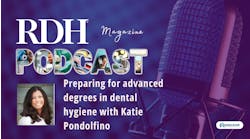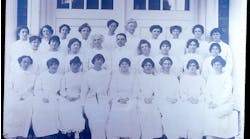By Dorothy Garlough, RDH, MPA
"Those who fail to innovate fail!" is a common message. With the changing demographics of dentistry1 and less expendable income within the general public, competition is greater than ever before. As professionals, we know the need for regular dental care, but we often observe many people looking upon regular dental appointments as optional. There is a clear need to become innovative in addressing this new reality. Like 80% of business leaders who see innovation as the number one skill required to maintain and grow their market share, dentists must become innovative.
How can we learn to become innovative? One technique is the "discovery cycle," a powerful tool that can transform problems into solutions and generate new ideas. With the technique, we become more "whole minded," using the entire brain -- the logical left brain and the creative right brain. This article will look at the skill of observation in the discovery cycle. The other skills of the discovery cycle -- questioning, networking, experimenting, incubating, and association -- will be or have been discussed in other articles.
Observation is defined as the active acquisition of information by the actions of watching and listening. Along with experience and reason, observation is recognized as the holy trinity of science. Max Euwe, grandmaster chess world champion, said that "strategy requires thought, tactics require observation." In fact, Procter & Gamble, one of the largest research and development companies globally, has changed its tactics for new products and processes. It has moved its research away from focus to observational research.1 Jeff Bezos, Amazon founder and CEO, recognizes the need for observation as well. As in the TV series, "Undercover Boss," he spends two days every two years working at the customer service desk so that he might have a hands-on experience in observing what is working and what is not working in the company's systems.
---------------------------------------------------------------
Other articles by Garlough
---------------------------------------------------------------
As professionals in the dental environment, we need to become intense observers. Are we watching the world around us, including patients, products, services, technologies, and businesses? Observation will help us gain insight into new ways of doing things. We need to act like anthropologists and build on our understanding of human behavior.2 Do we see a breakdown in communication with the hand-off of patients? Perhaps a patient cannot make his or her follow-up or restorative appointment on the shift of the original caregiver and rebooks with another clinician. Does patient care fall through the cracks because there is no standardization in treatment planning? Maybe you notice that part-time employees are not in the loop with new initiatives discussed at staff meetings when they were not present. How can you innovate to ensure that everyone knows what is going on? Perhaps a bulletin board, an in-house memo, or a member of the team assigned as the office newscaster can correct this breakdown in communication.
Innovators examine everything, paying attention to how things work, to what doesn't work, and why.3 Innovators study how people solve problems. They find common threads in activities that, although seemingly unconnected at first, aren't. They notice how different people do the same job in different contexts. An effective observer tries to spot people who have developed creative "workarounds" to solve problems. A workaround is an innovative way to resolve a particular frustration.
Note what frustrates your patients about their dental experiences. Maybe you observe they are not rebooking as they finish one appointment and wish they had the convenience of online booking. Where do your patients need help? What makes them abandon your office in favor of a competing office?
Heighten your powers of observation by changing your environment. Perhaps work out of a different operatory to see what works and what doesn't work in your fellow hygienist's usual operatory. Shift your focus: Watch workers, then patients, then entire organizations. Enhance your observational skills by documenting the how and why of failed innovations.
Be objective in your observations, knowing that your mind can play tricks on you. People tend to see supporting data on their already formed views. You need to become like Charles Darwin, who kept a separate notebook for any evidence that he observed that did not support his theory of evolution.4 He knew that his mental model could easily distort his findings, and he might rationalize what he saw. He recognized that good scientists keep notes on contradictions to theories and that his thinking would be improved by not shunning conflicting data.
Have you observed one hygienist is who markedly appreciated by her patients? Maybe patients refuse to be booked with another hygienist and maybe they even bring the hygienist gifts. The care delivered by the hygienist is commendable and her relationship with the patient is real. Clearly, there is a rapport with her patients. In today's business environment, the dentist wants to be the employer of choice for the employee of choice that patients want to work with. Do you recognize and model this behavior?
Perhaps you note that a clinician does not have strong case presentation skills and could use further education and training. You might see strife among employees with an eroding effect on morale. Because of astute observations, you can deflect potential catastrophes by intervening with training and open discussion.
Recognize that your own existing mental models limit your thought. Be willing to look at all ideas, even those that seem obscure. When Kimberly-Clark, a paper manufacturing company, first marketed Kleenex in the 1920s, it was marketed for women to remove makeup.4 Even after men and children began using the product for colds and allergies, the company resisted the added value because their paradigm was set. It wasn't until the 1930s that they shifted, adopting the expanded marketing advantage. Today, the Kleenex brand is recognized worldwide.
Constant renewal, remodeling, remolding of ideas and processes are a must to be effective and memorable. In a competitive environment, differentiate your practice by observing what others are doing and then do something different. The discovery cycle can help you in the quest for continuous improvement. When we become astute observers, we gain richer, more actionable insights on how our practices can be both economically successful and offer outstanding value to our patients. As the visionary educator, Amos Bronson Alcott, said: "Observation, more than books and experience, more than persons, are the prime educators."
How have you educated yourself today?
Steps to learning by looking
1. Wipe away preconceived ideas -- Be open to what you actually observe
2. Seek a larger body of material -- Broaden your perspective through varying viewpoints
3. Obtain wise counsel -- Listen to more than one expert
4. Record conversation -- Write conversations down for accuracy and reference
5. Engage in active listening -- Repeat what you heard to determine accuracy
6. Keep track of contradictions -- Recognize that this is good science
DOROTHY GARLOUGH, RDH, MPA, is an innovation architect, facilitating strategy sessions and forums to orchestrate change in both the dental and corporate worlds. As an international speaker and writer, Dorothy trains others to broaden their skill-set to include creativity, collaborative innovation and forward thinking. She recognizes that engagement is the outcome when the mechanisms are put in place to drive new innovations. Connect with her at [email protected] .
References
1. http://www.dentaleconomics.com/articles/print/volume-93/issue-2/features/the-changing-demographics-of-dentistry.html.
2. http://hbswk.hbs.edu/item/6760.html.
3. Dyer J, Gregersen H, Christensen CM. The Innovator's DNA. ISBN: 978142213481, Barnes & Nobel – 2011.
4. Roberto MA. Transformational Leadership: How Leaders Change Teams, Companies, and Organizations – The Great Courses. Disc 8, Negotiating as a Way of Life ISBN: 1-59803-745-5.
Past RDH Issues





